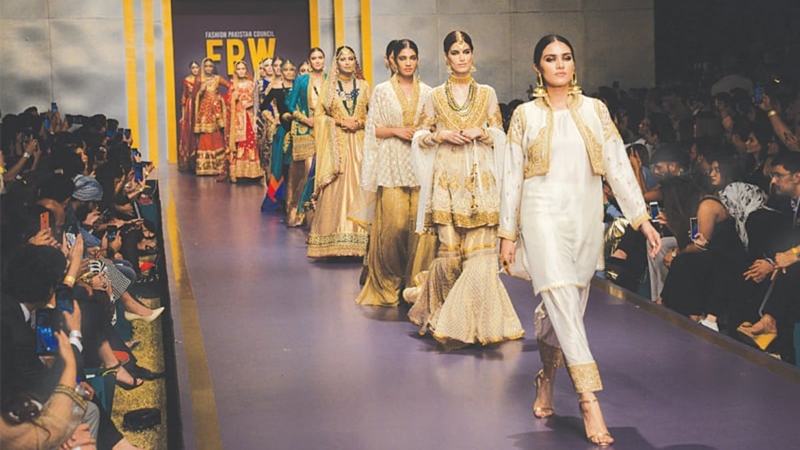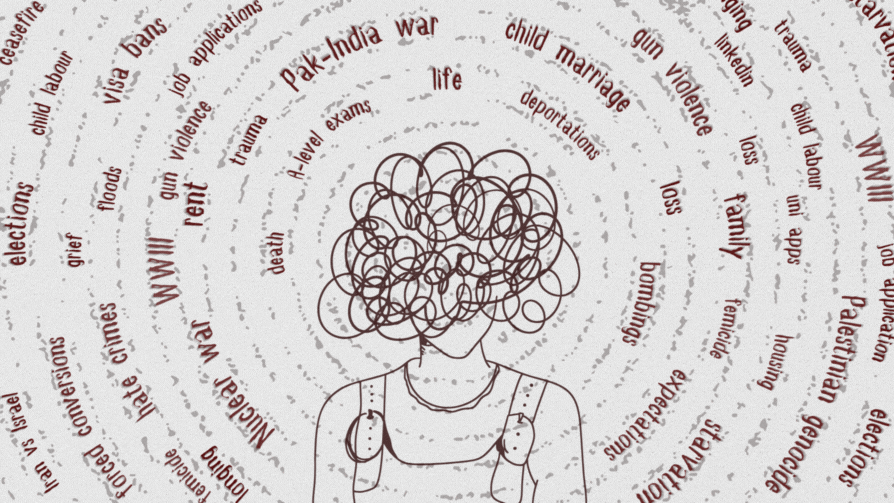Who will help Pakistan's fashion industry?
“I have heavily embellished wedding-wear hanging in my studio, ready to be picked up by clients,” a bridal-wear designer tell me.
“But no one’s coming to pick them up and to pay for them. I take a certain percentage as an advance when an order is placed but the main chunk of the money is only paid when the outfit is picked up.”
It is likely that the outfits will be picked up after a few months now. Weddings across the country – the world, even – have gotten postponed due to the coronavirus pandemic and the economy is at a standstill.

Clients are no longer coming in. They’d rather do so when their weddings are closer and when the economic situation is better and they can be more comfortable with paying large sums of money.
But this leaves this bridal-wear designer – and all the many, many others in Pakistan’s fashion industry – in a quandary. They aren’t earning anything but they still have overheads to pay: rent, electricity and water bills and employees’ salaries.
Read: Pakistan's fashion industry is stepping up to fight Covid-19
If the lockdown continues for a few more months, they may have to take drastic measures like laying off employees or at worst, shutting down their businesses altogether.
At the other end of the spectrum, the high street is writhing in its own crisis. There are formal lawn collections that were just about to launch that are now just lying in store-rooms, Ramazan and Eid line-ups that were expected to haul in profits and inventory hanging uselessly in shops and factories that are shut down.
And even if the lockdown ceases and stores open, it is unlikely that customers will have the financial stability to buy as avidly as they used to. Some limited revenue is being earned via online sales, but courier services are currently yo-yoing from being banned to working at a snail’s pace. Revenue is hardly enough for brands to be able to meet their overhead costs.
“Fashion is ultimately a discretionary product,” says Waleed Zaman, Creative Director of high-street brand Kayseria and Leisure Club.
“People can live without new clothes and shoes but they can’t live without food or medicines. They will ultimately be spending more on the latter. In the pre-pandemic world, retail in Pakistan was growing at a rate of about 10 to 25% per annum. Now, once stores open, we are expecting our sales to slow down by 30 to 40%.”
“If this doesn’t end soon, a lot of people won’t have any choice but to lay off staff,” observes designer Zara Shahjahan.
“But we want to avoid this at all costs. As retailers and designers, we have trained our staff over the years and they are like family to us. We don’t want to consider letting them go. And even if we do, we won’t be able to find such skilled staff once things get better.”

Waleed Zaman observes, “Our biggest priority right now is to pay the rent for our stores and to pay our employees. We may have to impose salary cuts. If the lockdown continues, we won’t have a choice. And the high-street is going to have to rethink strategies in the post-corona world. Production lines will generally be more limited which means that less staff will be required.”
People could start losing jobs
But if the economic downturn due to the coronavirus lasts for several months, many retail businesses will inevitably shut down. Internationally, many major brands, including Zara and Macy’s have already closed down stores and laid off staff.
Many Pakistani retailers – including those catering to the high street and couture – will also have to let some of their staff go. But the consequences will be debilitating, resulting in unemployment within the country’s burgeoning working class.
Designer Rizwan Beyg states, “Fashion is a luxury and I don’t think people will be focusing much on luxuries right now. We will have to rethink the way we work.”
Consider the following statistics: according to an article in the Business Recorder, about 4.55 million people can be expected to be laid off in the wholesale and retail sector if the lockdown continues. The retail sector is the second biggest employer of labor in Pakistan, the first being agriculture.
Zoning in on the high street and designer-wear market, hired personnel include craftspeople, factory workers and sales staff.
“The designer-wear sector also provides employment to a large number of women,” points out Zara Shahjahan.
Designer Deepak Perwani says, “It is our intention to continue supporting our staff even if business goes through a low phase. The luxury fashion sector is the first to take a hit during economically difficult times – may it be due to political tensions or, in this case, a pandemic. Every fashion retailer knows this.”
But till how long can Deepak continue to support his staff? “As long as I can,” he says. “But a lot of businesses won’t be able to. No one will be able to survive if this continues for longer.”
Designer Rizwan Beyg states, “Fashion is a luxury and I don’t think people will be focusing much on luxuries right now. We will have to rethink the way we work.”
A call for help
“I think that it’s important that the government comes to our aid right now,” says couturier Nomi Ansari. “We are tax-paying businesses and we run transparent, ethical operations. Right now, our businesses have come to a halt but the government can help us by reducing some of our overhead expenses.”
But then again, every sector across the country is bidding for financial help from the government. Nevertheless, this does not mean that retail, a major part of the country’s economic landscape, can be ignored.
Asfandyar Farrukh, Managing Director at Hub Leather and HOBO, points out, “Retail is simply the front face and it is connected to so many other businesses at the back end. Cottage industries, the services sector, packaging and even commercial construction is dependent on the growth of the retail sector.”
Children’s wear brand Hopscotch’s owner, Romana Abdullah, outlines her particular difficulties: “As a small, relatively new retail brand, we were already struggling prior to the coronavirus panic. The economy has been downsliding for a while and the increase in sales tax last year had further reduced our profits. We couldn’t hike our prices too high lest we lose out on customers which is why we were bearing most of the burden of the tax."
Now, our brick and mortar business is nil. Online business till last week was not operational due to the restriction on courier services. Now, some online sales are picking up but with deliveries delaying to as much as 20 days, customers also end up backing out.”
“There is also the fear that a delivered package may be infectious. That further dissuades people from online retail.”
“In such dire circumstances, how can a business like ours survive? We are one of the very few small brands that has integrated with the FBR and are regularly paying taxes. This should ideally work to our advantage with the government offering us support.”
Waleed Zaman makes a similar point: “There are very few retail businesses in Pakistan that are tax compliant. This is the time when the government needs to set an example by protecting these businesses so that others can also integrate with the FBR and start operating more ethically.”
“Retail is simply the front face and it is connected to so many other businesses at the back end. Cottage industries, the services sector, packaging and even commercial construction is dependent on the growth of the retail sector.”
What support could the government offer the retail sector? Workers could be given benefits so that their households can still function despite enduring pay cuts.
Asfandyar Farrukh says that, if nothing else, taxes need to be eased at least temporarily. “The sales tax could be decreased so that we can at least price our products attractively, inducing customers to make purchases despite lower purchasing power.”
“In Karachi, even e-commerce is not allowed at this point. The government needs to open up this avenue so that we can at least have some space to breathe!” he adds.
Also, loans could be made available to all businesses, big and small, at subsidized interest rates.
“The government has announced that it will be offering loans via the State Bank of Pakistan at a low interest rate but the bank has been given the discretion to decide who will be given the loan,” says Romana Abdullah.
“Inevitably, this could mean that big businesses with collateral will be preferred over smaller ones. The government needs to come up with better policies.”
When the going gets tough… the tough restrategize
Will the government recognize the dire needs of the retail sector? And if it does, will it ensure the survival of struggling fashion and high-street retail brands? In the post-pandemic world, only brands that reinvent themselves will be able to last.
“We will all be making matching face masks with clothes,” Maheen Khan says, “and I am not joking!”
Farnaz Ahmed, Director at Image Fabrics, says that her brand’s focus has shifted largely towards online sales. “We are building up on e-commerce because inevitably, an increasing number of sales are now going to be online. Revenues will definitely be lower but we are restrategizing by playing up to our strengths."
"Maybe the regular customer will no longer want to spend over a million on embellished wedding-wear – instead, she may come to our store and purchase a chikankari chiffon shirt, worked with gota, that costs about Rs 15,000. Buyer dynamics are going to change but we can benefit by recognizing exactly what the customer will want to buy now.”

Shamoon Sultan, CEO at Khaadi, has similarly stressed that his brand will now be focusing more on its core strengths. He also adds, “There will definitely be lesser retail stores.”
Also read: Fashion Pakistan Week 2020 postponed amid coronavirus uncertainty
Pakistan’s new wave of shopping malls may also suffer for some time.
“For some time people will avoid going to malls or even enclosed shops because they will fear getting infected,” says Waleed Zaman. “Online buying will definitely pick up and perhaps standalone stores will work better for now.”
It is expected that in an effort to simply break-even – or bring in some earnings, even at a loss – brands will be putting out sales.
“We have so much inventory at Kayseria right now, ranging from unstitched casual cottons to festive-wear aimed for Ramazan and Eid. Realistically, I know that we will have to sell most of this stock at massive discounts just in order to keep money coming in. For the next season, then, we will definitely be working with smaller product lines and focusing more on essentials that last longer.”
Perhaps, this will be one of the better outcomes of the coronavirus: a new-age customer who doesn’t prioritize showing off, who buys the one lawn suit that she needs rather than five more. The post-pandemic high street and luxury brand will be more concerned about quality and delivering original designs. The fashion weeks could be fewer but showcase better clothes.
In the realm of couture, Rizwan Beyg observes that designers will have to plan their businesses in new ways.
“I am fortunate because most of the embellishments on my designs are created by craft clusters in southern Punjab. I send work to these women, sitting in their homes, who then send it back to me. If I feel that there is a drop in customer demand, I will send them less work. Some money is better than no money at all and that rings true for every one of us, including the craftspeople that work for us.”
“Other designers may have to shift machinery to workers’ homes so that social distancing is observed while some work continues to be done.”
Will this enable designers to last the long haul? Shehnaz Basit, Chief Operating Officer at Gul Ahmed, says, “Customers will only appreciate and support brands that maintain quality and offer sensible pricing. People are going to be more discerning about what they buy and we have to make sure that they offer them value for money.”
Perhaps, this will be one of the better outcomes of the coronavirus: a new-age customer who doesn’t prioritize showing off, who buys the one lawn suit that she needs rather than five more.
Also, the post-pandemic high street and luxury brand will be more concerned about quality and delivering original designs. The fashion weeks could be fewer but showcase better clothes.
People may buy less – but they may end up wearing better clothes and being more conscientious. It’s going to be a painful ride, but the coronavirus apocalypse could take fashion into better new directions.












Comments